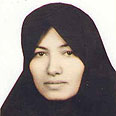

Iran on Tuesday rejected an offer by Brazilian President Luiz Inacio Lula da Silva to give asylum to an Iranian woman sentenced to death by stoning for having an extra-marital relationship.
The sentence imposed on Sakineh Mohammadi Ashtiani, who denies the charges against her, has angered rights groups and caused an international outcry. It has been suspended pending a review by Iran's judiciary, but could still be carried out.
Lula called on Iranian President Mahmoud Ahmadinejad last week to let Brazil give refuge to Mohammadi Ashtiani, but the Islamic Republic rebuffed the offer.
"From what we know about Mr. da Silva, he has a humane and sensitive character and probably he has not been provided with enough information," Foreign Ministry spokesman Ramin Mehmanparast told a news conference.
"We can give details of this person's crimes, who has been convicted, and then I think the issue will be clarified for him," Mehmanparast said.
'Appeal more humanitarian than political'
Iran and Brazil have drawn closer this year after Brazil and Turkey brokered a proposed compromise deal on Iran's uranium enrichment work, which the West fears is a cover for developing a nuclear bomb.
Tehran rejects the accusation, saying it only wants to generate electricity.
At a summit in Argentina, Lula reiterated his opposition to UN Security Council sanctions against Iran and said he had offered asylum to the woman as a humanitarian gesture.
"For me, death by stoning is so barbaric that I said Brazil would receive this woman with open arms," he told a news conference. "My appeal was more humanitarian than political."
Murder, adultery, rape, armed robbery, apostasy and drug trafficking are all punishable by death under Iran's sharia law, enforced since the 1979 Islamic revolution.
Human rights group Amnesty International has said Mohammadi Ashtiani was convicted in 2006 of having an "illicit relationship" with two men and received 99 lashes as her sentence.
The rights group said that, despite this, she was subsequently convicted of "adultery while being married", which it said she denied, and was sentenced to death by stoning.
Amnesty has listed Iran as the world's second most prolific executioner in 2008 after China, and says it put to death at least 346 people in 2008.
The Iranian authorities routinely dismiss charges of rights abuses, saying they are following Islamic sharia.















